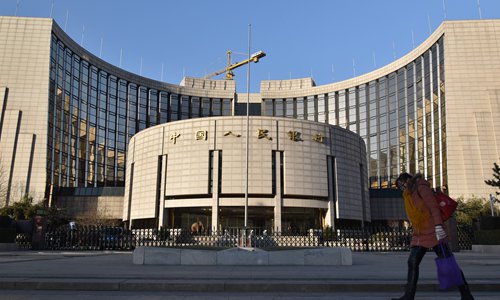HOME >> BUSINESS
Foreign exchange market remains stable, to keep expanding: PBC
Source:Global Times Published: 2019/6/13 20:13:41

A view of the PBC building in Beijing Photo: VCG
China has maintained a stable foreign exchange rate and will steadily improve the opening of its financial market, as well as promote the liberalization of cross-border trade and investment, Pan Gongsheng, deputy governor of the People's Bank of China (PBC), said at the Lujiazui Forum on Thursday.
China's moves to strike a balance between flexibility and stability of the exchange rate are beneficial for both domestic and foreign markets as they will help avoid negative spillover in the global financial market, and curb the competitive depreciation of major currencies, Pan said.
Net overseas purchases of China's bonds have totaled 500 billion yuan ($72.3 billion) so far this year, including net purchases of 168.8 billion yuan in May, and there is strong demand among foreign investors to allocate yuan-denominated assets, he noted.
Given that the China-US trade war continues to escalate, the yuan exchange rate has depreciated to some extent, while Chinese companies and citizens are behaving in a rational manner in the foreign exchange market and China's foreign exchange reserves have been steadily rising in 2019, Pan said.
The central parity rate of the yuan against the US dollar stood at 6.8934 on Thursday, according to PBC Thursday.
China's foreign exchange reserves exceeded $3.1 trillion at the end of May, up $6.1 billion over the previous month, official data showed on Monday.
Shanghai will be actively supported to cultivate a global yuan asset allocation and risk management center, Pan said, adding that Shanghai could enrich the currency's products and tools, improve its pricing power, promote the cross-border use of the yuan and improve the efficiency of its settlements.
China's financial market is opening up faster and has made substantive reforms in terms of expanding market access, enriching risk-hedging tools and others, and China's stock and bond markets have been gradually included in international mainstream indexes, he said.
Posted in: MARKETS